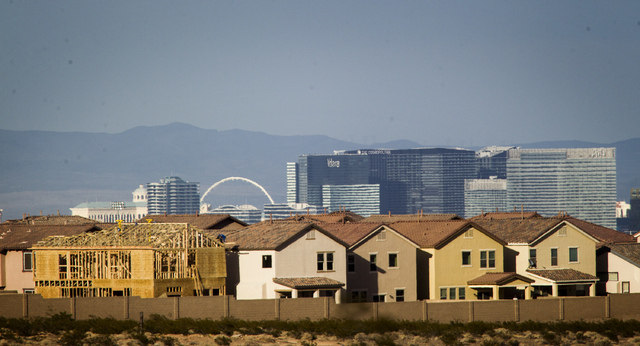Share of Nevada homes bought by major investors drops to 6.5 percent
Nevada’s housing markets continued to stabilize in January, as a key investment sector eased off on home purchases here.
The share of Nevada homes bought by big, institutional investors such as Wall Street private-equity firms sank in January to 6.5 percent, down from 10.7 percent in January 2013, a Wednesday report from Irvine, Calif., research firm RealtyTrac shows.
Short sales stumbled statewide, too, dropping to 13.4 percent, compared with 22.9 percent a year earlier.
Nationwide, institutional investors comprised 5.2 percent of January’s market, while short sales were 5.9 percent of all closings.
But the statistics also showed lingering effects of the housing bust in Nevada: Cash sales, which often signal small-investor activity, ticked back up to 53.7 percent, compared with 48.3 percent in January 2013, RealtyTrac’s report said. Bank-owned sales, which complete the foreclosure process, came in at a nation-leading 23.7 percent, up from 20.3 percent a year earlier.
Across the country, cash sales were 44.4 percent of all closings, and bank-owned sales made up 10.2 percent.
The Las Vegas Valley’s share of institutional investor buys fell to 7.2 percent, compared with 10.1 percent a year earlier.
Heidi Kasama, president of the Greater Las Vegas Association of Realtors, said big investors have cooled on Southern Nevada because the economics don’t look as favorable. The median price of a local, single-family home was up 24 percent year over year in December, to $185,000. At the same time, more rentals have come onto the market, which means lower lease rates.
“From an investor standpoint, prices are higher and rents are lower,” Kasama said. “So our market is no longer as attractive.”
Investors were important to the city back in 2012, when distress sales made up nearly 80 percent of the market and locals were afraid to buy, Kasama said. But it’s important to see the pendulum swing away from them.
“People can say good and bad things about investors, but they bought these homes, got the lawns green again and put them up for rent. They got people back in the neighborhood,” she said. “But while that was happening, people couldn’t buy homes to live in them. It was so heartbreaking for true homeowners trying to get into these homes. I’m pleased to see we’re going toward a more steady market that promotes homebuyers in the community.”
Still, some local investment indicators remained above average. The share of cash buyers in January was 56.5 percent, good for No. 5 among the nation’s 50 biggest metros, and up from 40.1 percent a year earlier.
Local short sales dropped to 14.9 percent, down from 25.7 percent year over year, while bank-owned sales made up 25.6 percent of the market, up from 22.8 percent a year ago.
Las Vegas was also among the 17 of the 50 biggest cities that saw annualized sales drop year over year in January. The city’s annualized sales rate of 57,452 closings was down 11 percent from a year earlier.
Contact reporter Jennifer Robison at jrobison@reviewjournal.com. Follow @J_Robison1 on Twitter.






















